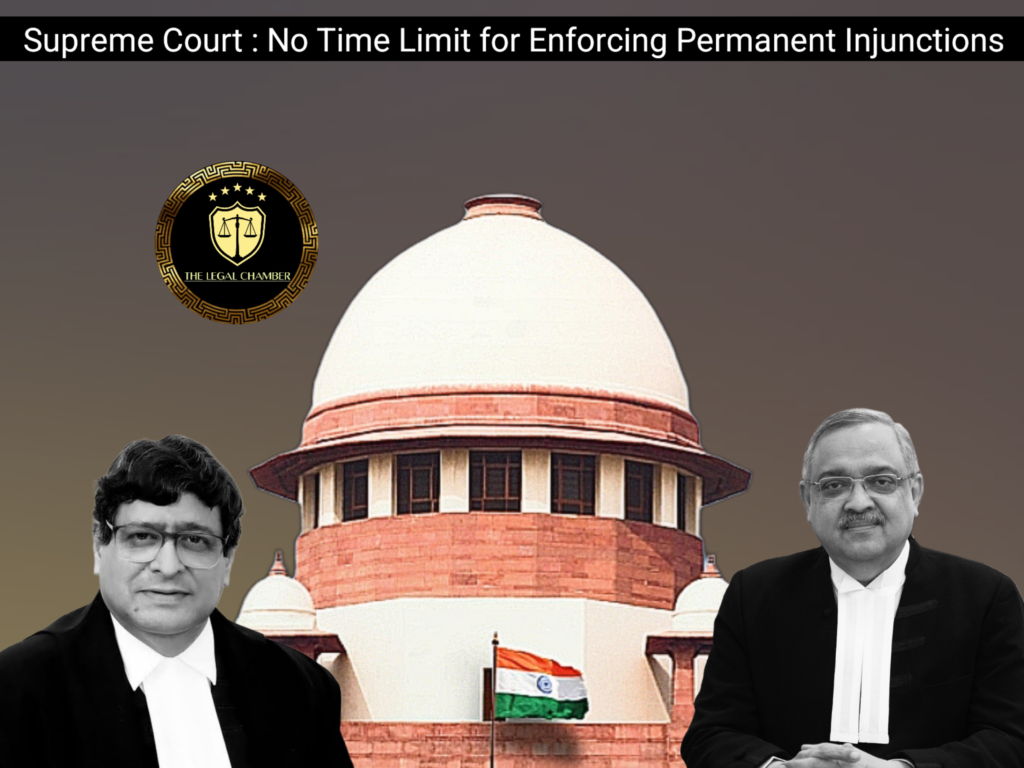
The Supreme Court ruled that a decree of permanent injunction creates a perpetual right enforceable at any time against future breaches, clarifying that satisfaction recorded in one execution petition doesn’t bar subsequent petitions under Section 47 CPC for fresh violations. It held that Article 136 of the Limitation Act imposes no time limit for enforcing perpetual injunctions, rejecting the erroneous application of res judicata by lower courts. The judgment emphasizes that each breach of injunction constitutes a fresh cause of action, requiring executing courts to examine subsequent execution petitions on merits regardless of prior disposals. The Court distinguished between temporary and permanent injunctions while underscoring the continuing nature of injunctive relief.
Facts Of The Case:
The case originated from a 1988 civil suit filed by Saraswati Devi’s predecessor against Santosh Singh and others regarding agricultural land in Champawat district. The trial court decreed the suit in 2000, granting a permanent prohibitory injunction against interference with the plaintiffs’ possession of the land and cancelling a 1998 supplementary sale deed executed in favor of the defendants’ predecessors. The decree-holders initiated multiple execution proceedings over the years – the first EP was closed in 2007 when both parties were absent, with the court recording satisfaction based on the judgment-debtors’ written undertaking not to interfere. A second EP was filed but not pressed. In 2012, the legal heirs of the original plaintiffs filed EP No. 2 alleging fresh obstruction, which the executing court dismissed applying res judicata due to the earlier satisfaction recorded. This dismissal was affirmed in revision and subsequently by the High Court through a writ petition. The Supreme Court noted the defendants had never appeared in earlier proceedings nor raised their current contention about relying on a separate 1984 sale deed. The apex court found the lower courts fundamentally erred in treating the permanent injunction decree as having limited enforceability and misapplied res judicata to successive execution petitions arising from alleged fresh breaches.
Procedural History:
The case originated from Civil Suit No. 44/1988 which resulted in a 2000 decree granting permanent injunction to Saraswati Devi’s predecessors. Multiple execution petitions followed: the first EP was closed in 2007 with recorded satisfaction based on defendants’ undertaking; a second EP was filed but not pressed. In 2012, appellants filed EP No. 2 alleging fresh obstruction, which the Executing Court dismissed applying res judicata due to the earlier satisfaction. This dismissal was affirmed by the Revisional Court in 2013. The appellants then filed a writ petition before the High Court, which was dismissed in 2019 along with their review petition. The Supreme Court granted leave in 2020 in the special leave petitions (SLP(C) Nos. 2817-2818/2020) and ultimately allowed the appeals in 2025, setting aside all lower court orders and restoring EP No. 2 for fresh consideration by the Executing Court. The procedural journey spanned 25 years across four judicial tiers, with the Supreme Court finally clarifying the continuing enforceability of permanent injunction decrees.
READ ALSO :Supreme Court Clarifies Limits of Section 482 CrPC Powers :High Courts Can’t Revive Quashed FIRs After Compromise
Court Observation:
The Supreme Court made several critical observations while allowing the appeal. It emphasized that a decree of permanent injunction creates a perpetual right enforceable against the judgment-debtors and their successors at any time a breach occurs, noting that Article 136 of the Limitation Act specifically excludes time limits for enforcing perpetual injunctions. The Court clarified that recording satisfaction in one execution petition does not operate as res judicata for subsequent petitions alleging fresh breaches, as each violation constitutes a distinct cause of action. It strongly criticized the lower courts for misapplying legal principles, observing that the High Court fundamentally misconstrued the nature of permanent injunctions by treating them as having limited enforceability. The Bench underscored that the executing court must examine each execution petition on its own merits when fresh obstructions are alleged, regardless of prior disposals. Significantly, it distinguished between temporary and permanent injunctions, highlighting the continuing nature of the latter’s protection. The Court also noted that the defendants’ belated claim about a 1984 sale deed – never raised in earlier proceedings – required proper examination by the executing court rather than summary rejection. These observations reaffirmed the enduring enforceability of perpetual injunctions while correcting the lower courts’ erroneous application of res judicata to execution proceedings.
Final Decision & Judgement:
The Supreme Court, in its final judgment dated May 16, 2025, allowed the appeals and set aside the orders of the High Court, Revisional Court, and Executing Court. The Bench comprising Justices Sudhanshu Dhulia and K. Vinod Chandran held that EP No. 2 of 2012 was wrongly dismissed based on the erroneous application of res judicata, restoring it for fresh consideration by the Executing Court. The Court ruled that permanent injunction decrees create perpetual rights enforceable at any time against recurring breaches, with no limitation period under Article 136 of the Limitation Act. It clarified that recording satisfaction in prior execution proceedings doesn’t bar subsequent petitions for fresh violations, as each breach constitutes a distinct cause of action. The judgment directed the Executing Court to reconsider the matter afresh, permitting both parties to raise all contentions, including the defendants’ belated claim regarding the 1984 sale deed and any pending proceedings for decree cancellation. The Court made clear that its prima facie observations on the Section 47 CPC objections shouldn’t influence the Executing Court’s independent determination. All pending applications were disposed of, finally resolving the 25-year-old litigation while establishing important precedents on the continuing enforceability of permanent injunctions.
Case Details:
Case Title:Saraswati Devi & Ors. vs. Santosh Singh & Ors. Citation:2025 INSC 715 Appeal No.: (Arising from SLP(C) Nos. 2817-2818 of 2020) Date of Judgment:May 16, 2025 Judges/Justice Name: Justice Sudhanshu Dhulia & Justice K. Vinod Chandran
Download The Judgement Here